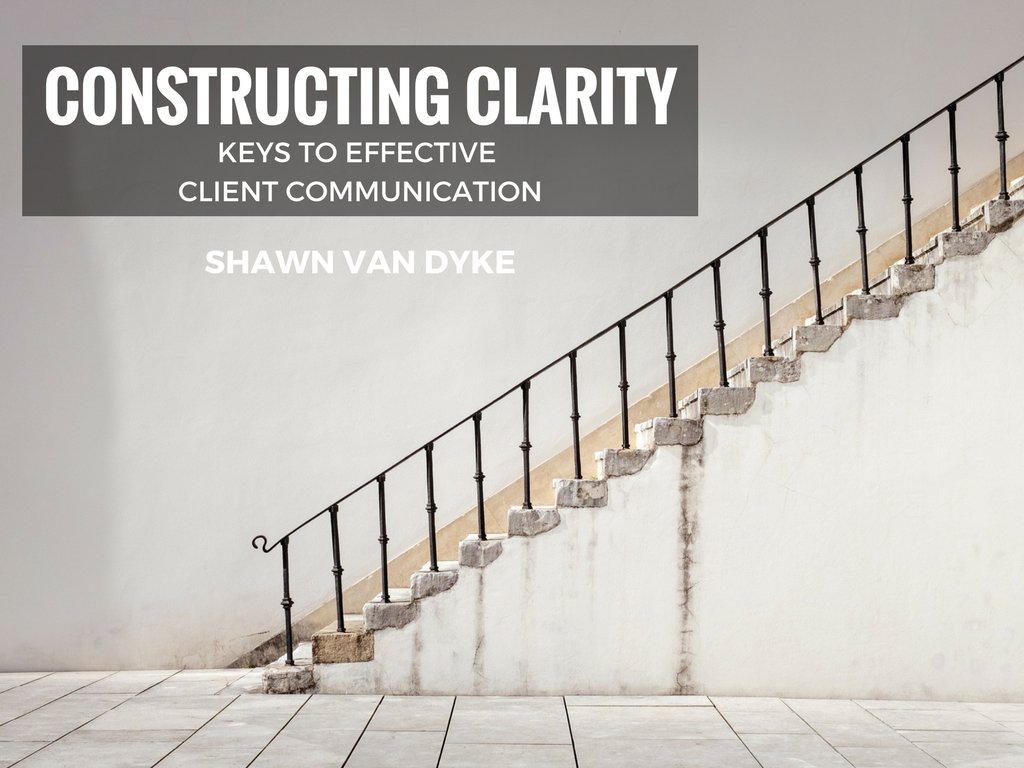Built to Build: Blog
Communication between Contractor and Client

CLICK BELOW TO LISTEN TO THE BLOGCAST OF THIS POST.
Leading your construction clients through a successful project involves showing them the steps from conception to completion.
Navigating this path is made easier when the client/contractor relationship is built on trust. Establishing that trust with your clients can only occur when they understand your process, the language of your construction contracts, and the methods of communication.
In this article on Fine Homebuilding.com, I list 3 Keys to Effective Client Communication.
The way in which you communicate with your clients is just as important as the quality of the work your construction company produces. A lack of communication during a construction project will cost your company time (money) and create unhappy customers (poor customer service).
DESCRIBE THE PROCESS
Your potential clients, like your employees, need to know how your company works. They think they know what a contractor is supposed to do, but what they think about the construction process is usually wrong.
The process you describe to them needs to educate them on the following steps:
-
- Determine the budget and develop the estimate.
- Define the scope of work.
- Develop the proposal based on the scope of work.
Tell your potential clients how you will walk them through the steps listed above, what information you will need from them along the way, and when they can expect this initial process to be complete.
You will also need to develop a process of executing the work once you have a signed contract.
Explain the phases of production, the milestones of the project, and how information moves along the chain of command.
DEFINE THE TERMS
The language you use in your communications with your clients must be understood by both parties to be effective.
This includes the words you say during the sales process as well as the terms you use in your written contract.
Even though you and your client speak the same language, your clients don’t understand the common vernacular of the construction world.
Below is a list of construction terms that clients may not understand, and some questions you should be prepared to answer:
Allowance
Is the allowance included in the price quote or is it in addition to the price?
Does the allowance include tax?
Does it also include installation labor?
What happens if I choose something above/below the allowance?
Change Order
What is a Change Order?
When will I know a Change Order is happening?
How much are Change Orders?
When do I pay for the Change Order?
What happens if I don’t approve a Change Order?
Substantial Completion
What does substantial completion mean?
How much or what kind of work remains at substantial completion?
Is there a payment due upon substantial completion?
Punch List
What is a punch list?
Why do you need to do a punch list?
Who is responsible for creating the punch list?
Warranty Work
What is the difference between a punch list item and warranty work?
How long is the warranty period?
When does it start and end?
Who do I contact for warranty work?
Who is responsible for warranty work?
What is the difference between warranty work and repair work?
Defining the terms in your written contracts as well as during your sales process will help streamline the communication with your clients.
DESIGNATE THE METHODS
Once you have described your process and defined the terms, you will need to designate the methods of communication that your company uses.
Here are some questions to ask yourself:
-
- Your clients need to know who the designated contact is. What is the best way to contact this person – email, text, phone?
- How will the proposals, contracts, invoices, and updates be delivered to the client?
- What method of payment do you accept and how will those transactions take place?
- If the client will not engage with you through the methods you have designated, how will you deal with this?
Your goal should be to make communication with your company as easy as possible. This may require some flexibility in order to serve the client, but lack of communication will cost not only money, but also trust.
You must communicate to your construction clients how to communicate with your construction company so that the construction project is a success for everyone.
Do not assume clarity. Produce it.
If you want to streamline your construction business and DOUBLE your profits next month…
download my FREE book: The Paperwork Punch List

